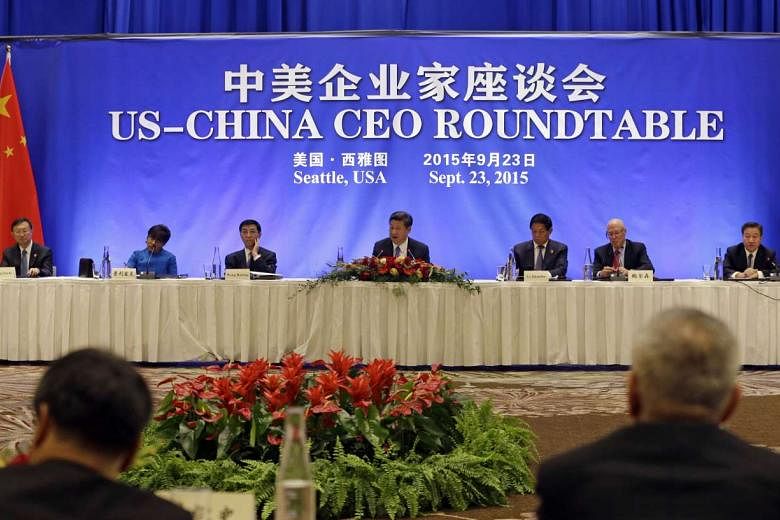BEIJING • When Mr Wang Huning, a policy adviser to the Chinese president, made a six-month trip to the United States in 1988, he returned with notes for a 400-page memoir.
As President Xi Jinping made his first state visit to the US, with a day packed with pageantry and diplomacy at the White House yesterday, Mr Wang was among a small group of advisers at his side.
People who knew Mr Wang say he has become unapproachable and ignores invitations for conversations. American officials find it difficult to talk to him casually on the sidelines of international forums.
They and other Western officials say that this icy remove is true not only of Mr Wang, but also of other advisers with whom Mr Xi travels, including Mr Li Zhanshu, essentially Mr Xi's chief of staff, and Mr Liu He, his top economic adviser.
The problem presents a huge challenge for the US and other nations. By some standards, Mr Xi's administration is the most secretive in 66 years of Communist rule.
In past decades, foreign officials could speak with senior Chinese officials or aides and trust that those people were proxies for their leaders. The most famous example is Mr Zhou Enlai, the Chinese premier under Mao Zedong, with whom Dr Henry Kissinger secretly negotiated the US-China rapprochement.
With Mr Xi, those channels do not exist. "One of the problems we have in US-China relations now is that we basically don't know these people," said Dr David M. Lampton, director of China Studies at the Johns Hopkins School of Advanced International Studies.
"I don't think we have a very good understanding of who below Xi Jinping speaks for him."
The refusal of Mr Xi's inner circle to develop ties with Western officials is consistent with a fundamental belief that has become widespread in the system here - namely that Western ideas and influences will undermine the Communist Party and lead to a "colour revolution".
There is also broad agreement that Mr Xi keeps colleagues and advisers - especially technocrats in state ministries - at more of a distance than other Chinese leaders did and that he relies mainly on his own knowledge and instincts in making decisions.
When he wants to listen, he turns more to party groups.
He is the head of seven of 22 "leading small groups", opaque policy councils that weigh in on matters ranging from economics to cyber security. And he created the National Security Commission, another secretive group that aims to coordinate security policy to defend the party against internal and external threats.
"I believe it is President Xi who is calling the shots," said Dr Su Hao, a professor at China Foreign Affairs University in Beijing. "He is the paramount leader, and the major policies will have to come from him. Others can only help him during the process."
"We're seeing something new with Xi," said Dr John Delury, an author of Wealth And Power, a book on modern Chinese history. "Never has the gap been bigger between No. 1 and everyone else."
That Mr Xi keeps a tight grip on authority and does not divest power could be a result of his experiences during the Cultural Revolution. "The thing they don't have is trust," Dr Delury said of that generation.
Others say Mr Xi learned a lesson about the importance of hoarding power after seeing how his predecessor, Mr Hu Jintao, was weakened by Mr Jiang Zemin, the former president who kept pulling levers after his retirement.
"It taught him a lot about what not to do," said Mr Christopher K. Johnson, a former China analyst at the Central Intelligence Agency who is now at the Centre for Strategic and International Studies in Washington.
"Don't let these alternative power sources develop under you. Keep everyone a little off balance."
NEW YORK TIMES

